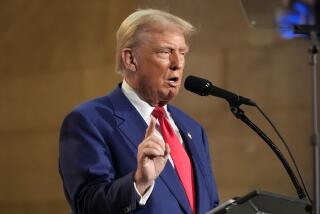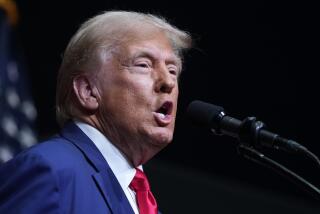Military Might, Strong Economy Linked, Clinton Says at West Point : The Presidency: He makes another pitch for his $496-billion deficit reduction package. White House denies energy tax plan will be abandoned.
- Share via
WEST POINT, N.Y. — In a Memorial Day weekend speech to graduating cadets at the U.S. Military Academy, President Clinton made another pitch for his $496-billion deficit reduction package, saying the nation’s military strength and continuing global leadership will depend on a strong economy at home.
Despite the end of the Cold War, the nation must maintain a substantial military establishment “superior to all other military forces in the world,” he said. “We must be mindful, even as we try so hard to reduce this terrible national deficit, that there is a limit beyond which we must not go . . . the end of the bipolar superpower Cold War leaves us with unfamiliar threats, not the absence of danger.”
Aides had suggested earlier this month that Clinton would use the graduation speech to outline the basis of his foreign policy views. Instead, Clinton chose to put in a plug for congressional passage of his economic program and stuck to other less controversial themes--praising the corps of cadets for their character and values and warning about the continuing dangers the nation faces in the world.
He received a polite reception from the graduates and their families, although one notably less warm than the welcome lavished on former President George Bush when he delivered a farewell address here in January.
In urging support for his economic plan, Clinton repeated what has become, for him, a familiar theme--that national security ultimately depends on the health of the national economy.
“Just as our security cannot rest upon a hollow Army, neither can it rest upon a hollow economy,” he said. “Our global leadership must, must depend on our ability to create jobs and growth and opportunity for Americans here at home.”
Separately, White House officials denied reports that the President had decided to abandon his controversial energy tax in favor of an 8-cent-a-gallon gasoline tax increase. “The President has been very clear about the gas tax; he doesn’t support it,” Press Secretary Dee Dee Myers said.
Still, Myers conceded that what may be a significant reduction in the size of the proposed energy tax “is what we have to work out with the Senate” as the price of winning its approval of Clinton’s economic agenda.
Other aides said Clinton had personally assured at least one senior official on Friday morning that while he would accept a scaling back of the energy tax, he would not accept a wholesale restructuring of it. Clinton has proposed a tax on all forms of energy, referred to as a BTU tax because it would be levied on the basis of the heat content of fuels, measured in British thermal units.
On CNN’s “Newsmaker Saturday,” Sen. John B. Breaux (D-La.), a member of the Senate Finance Committee, said he has told Clinton the BTU tax proposal will need “some major and dramatic changes.”
“If we had to have a revenue tax on energy, let’s have a gasoline tax,” Breaux added. “I think the President will accept and will ultimately support modifications to the BTU tax.”
The proposed BTU tax would raise roughly $71 billion over five years, and aides suggested Clinton might accept a scaling back to a figure closer to $40 billion--the amount that an 8-cent gasoline levy increase would raise. But, the aides said, Clinton remained opposed to a straight gasoline-tax increase because of concerns that it would hurt the poor unduly and because the impact of such a tax would be uneven across the nation, falling far more heavily on rural areas and on Western states.
One possibility that has been discussed, a senior official said, was a small increase in the gasoline tax--perhaps 2 cents, which would raise $10 billion over five years--coupled with a drastically scaled-back version of the BTU tax to raise another $30 billion.
During his speech to the cadets, Clinton joked about some of the troubles that have plagued his Administration, particularly his controversial haircut by celebrity stylist Cristophe, saying: “I must say I am impressed by your haircuts.”
He did not raise the issue of homosexuals in the military.
After the speech, hundreds of cadets worked their way to the podium at Michie Stadium to shake hands with the President, who lingered for about 40 minutes, then toured the academy, which overlooks the Hudson River.
More to Read
Get the L.A. Times Politics newsletter
Deeply reported insights into legislation, politics and policy from Sacramento, Washington and beyond. In your inbox twice per week.
You may occasionally receive promotional content from the Los Angeles Times.











